#devops testing specialists
Explore tagged Tumblr posts
Text
VodadoneThree - Account Manager
Job title: VodadoneThree – Account Manager Company: Vodafone Job description: working kit will provide you with everything you need, no matter where you are. Who We Are We’re here to build a network…, that future’s being built – today. We’re creating more than the UK’s best network. We’re helping close the digital divide… Expected salary: Location: United Kingdom Job date: Sun, 15 Jun 2025…
#5G Network Specialist#Android#Broadcast#business-intelligence#cloud-computing#computer-vision#CRM#Crypto#deep-learning#DevOps#dotnet#fintech#HPC#iot#it-support#legaltech#marine-tech#Networking#no-code#power-platform#project-management#qa-testing#robotics#scrum#sharepoint#site-reliability#technical-writing#telecoms#ux-design
0 notes
Text
Top 10 In- Demand Tech Jobs in 2025

Technology is growing faster than ever, and so is the need for skilled professionals in the field. From artificial intelligence to cloud computing, businesses are looking for experts who can keep up with the latest advancements. These tech jobs not only pay well but also offer great career growth and exciting challenges.
In this blog, we’ll look at the top 10 tech jobs that are in high demand today. Whether you’re starting your career or thinking of learning new skills, these jobs can help you plan a bright future in the tech world.
1. AI and Machine Learning Specialists
Artificial Intelligence (AI) and Machine Learning are changing the game by helping machines learn and improve on their own without needing step-by-step instructions. They’re being used in many areas, like chatbots, spotting fraud, and predicting trends.
Key Skills: Python, TensorFlow, PyTorch, data analysis, deep learning, and natural language processing (NLP).
Industries Hiring: Healthcare, finance, retail, and manufacturing.
Career Tip: Keep up with AI and machine learning by working on projects and getting an AI certification. Joining AI hackathons helps you learn and meet others in the field.
2. Data Scientists
Data scientists work with large sets of data to find patterns, trends, and useful insights that help businesses make smart decisions. They play a key role in everything from personalized marketing to predicting health outcomes.
Key Skills: Data visualization, statistical analysis, R, Python, SQL, and data mining.
Industries Hiring: E-commerce, telecommunications, and pharmaceuticals.
Career Tip: Work with real-world data and build a strong portfolio to showcase your skills. Earning certifications in data science tools can help you stand out.
3. Cloud Computing Engineers: These professionals create and manage cloud systems that allow businesses to store data and run apps without needing physical servers, making operations more efficient.
Key Skills: AWS, Azure, Google Cloud Platform (GCP), DevOps, and containerization (Docker, Kubernetes).
Industries Hiring: IT services, startups, and enterprises undergoing digital transformation.
Career Tip: Get certified in cloud platforms like AWS (e.g., AWS Certified Solutions Architect).
4. Cybersecurity Experts
Cybersecurity professionals protect companies from data breaches, malware, and other online threats. As remote work grows, keeping digital information safe is more crucial than ever.
Key Skills: Ethical hacking, penetration testing, risk management, and cybersecurity tools.
Industries Hiring: Banking, IT, and government agencies.
Career Tip: Stay updated on new cybersecurity threats and trends. Certifications like CEH (Certified Ethical Hacker) or CISSP (Certified Information Systems Security Professional) can help you advance in your career.
5. Full-Stack Developers
Full-stack developers are skilled programmers who can work on both the front-end (what users see) and the back-end (server and database) of web applications.
Key Skills: JavaScript, React, Node.js, HTML/CSS, and APIs.
Industries Hiring: Tech startups, e-commerce, and digital media.
Career Tip: Create a strong GitHub profile with projects that highlight your full-stack skills. Learn popular frameworks like React Native to expand into mobile app development.
6. DevOps Engineers
DevOps engineers help make software faster and more reliable by connecting development and operations teams. They streamline the process for quicker deployments.
Key Skills: CI/CD pipelines, automation tools, scripting, and system administration.
Industries Hiring: SaaS companies, cloud service providers, and enterprise IT.
Career Tip: Earn key tools like Jenkins, Ansible, and Kubernetes, and develop scripting skills in languages like Bash or Python. Earning a DevOps certification is a plus and can enhance your expertise in the field.
7. Blockchain Developers
They build secure, transparent, and unchangeable systems. Blockchain is not just for cryptocurrencies; it’s also used in tracking supply chains, managing healthcare records, and even in voting systems.
Key Skills: Solidity, Ethereum, smart contracts, cryptography, and DApp development.
Industries Hiring: Fintech, logistics, and healthcare.
Career Tip: Create and share your own blockchain projects to show your skills. Joining blockchain communities can help you learn more and connect with others in the field.
8. Robotics Engineers
Robotics engineers design, build, and program robots to do tasks faster or safer than humans. Their work is especially important in industries like manufacturing and healthcare.
Key Skills: Programming (C++, Python), robotics process automation (RPA), and mechanical engineering.
Industries Hiring: Automotive, healthcare, and logistics.
Career Tip: Stay updated on new trends like self-driving cars and AI in robotics.
9. Internet of Things (IoT) Specialists
IoT specialists work on systems that connect devices to the internet, allowing them to communicate and be controlled easily. This is crucial for creating smart cities, homes, and industries.
Key Skills: Embedded systems, wireless communication protocols, data analytics, and IoT platforms.
Industries Hiring: Consumer electronics, automotive, and smart city projects.
Career Tip: Create IoT prototypes and learn to use platforms like AWS IoT or Microsoft Azure IoT. Stay updated on 5G technology and edge computing trends.
10. Product Managers
Product managers oversee the development of products, from idea to launch, making sure they are both technically possible and meet market demands. They connect technical teams with business stakeholders.
Key Skills: Agile methodologies, market research, UX design, and project management.
Industries Hiring: Software development, e-commerce, and SaaS companies.
Career Tip: Work on improving your communication and leadership skills. Getting certifications like PMP (Project Management Professional) or CSPO (Certified Scrum Product Owner) can help you advance.
Importance of Upskilling in the Tech Industry
Stay Up-to-Date: Technology changes fast, and learning new skills helps you keep up with the latest trends and tools.
Grow in Your Career: By learning new skills, you open doors to better job opportunities and promotions.
Earn a Higher Salary: The more skills you have, the more valuable you are to employers, which can lead to higher-paying jobs.
Feel More Confident: Learning new things makes you feel more prepared and ready to take on tougher tasks.
Adapt to Changes: Technology keeps evolving, and upskilling helps you stay flexible and ready for any new changes in the industry.
Top Companies Hiring for These Roles
Global Tech Giants: Google, Microsoft, Amazon, and IBM.
Startups: Fintech, health tech, and AI-based startups are often at the forefront of innovation.
Consulting Firms: Companies like Accenture, Deloitte, and PwC increasingly seek tech talent.
In conclusion, the tech world is constantly changing, and staying updated is key to having a successful career. In 2025, jobs in fields like AI, cybersecurity, data science, and software development will be in high demand. By learning the right skills and keeping up with new trends, you can prepare yourself for these exciting roles. Whether you're just starting or looking to improve your skills, the tech industry offers many opportunities for growth and success.
#Top 10 Tech Jobs in 2025#In- Demand Tech Jobs#High paying Tech Jobs#artificial intelligence#datascience#cybersecurity
2 notes
·
View notes
Text
Top 6 Remote High Paying Jobs in IT You Can Do From Home
Technology has changed the scenario of workplaces and brought new opportunities for IT professionals erasing previous boundaries. Today, people are searching for both flexibility and, of course, better pay, which has made many look for remote well-paid jobs, especially in information technology field.
Advancements in technology have made remote work a reality for a growing number of IT specialists. Here, we will look into six specific remote high-paying IT jobs you can pursue from the comfort of your home:
Software Developer
Software developers are the architects of the digital world, designing, developing, and maintaining the software applications that power our lives. They work closely with clients, project managers, and other team members to translate concepts into functional and efficient software solutions.
In demand skills include proficiency in programming languages like Java, Python, Ruby, or JavaScript, knowledge of frameworks like React or Angular, and a strong foundation in problem-solving and communication. Platforms like Guruface can help you learn the coding skills to land a software developer job budget-friendly.
The average salary for a remote software developer is highly competitive, ranging from $65,000 to $325,000 according to recent data.
Data Scientist
Data scientists are the detectives of the digital age. They use their expertise in data analysis to uncover valuable insights and trends from large datasets, informing business decisions and driving growth.
To excel in this role, you'll need strong programming skills in languages like Python, R, and SQL, a solid understanding of statistical analysis and machine learning, and the ability to communicate complex findings effectively. Guruface is one of the leading online learning platforms that provides affordable data science courses.
The average salary for a remote Data Scientist is $154,932, with top earners exceeding $183,000.
Cloud Architect
Cloud architects are the masterminds behind an organization's cloud computing strategy. They design, plan, and manage a company's cloud infrastructure, ensuring scalability, security, and cost-effectiveness.
Cloud architects must be well-versed in cloud computing technologies from various providers like Amazon Web Services (AWS), Microsoft Azure, and Google Cloud Platform. In addition, proficiency in architectural design, infrastructure as code (IaC), and security compliance is essential. If you're interested in becoming a cloud architect, Guruface offers courses that can equip you with the necessary skills. Their cloud architect training programs can help you gain proficiency in cloud technologies from industry leaders like AWS, Microsoft Azure, and Google Cloud Platform.
The average salary for a cloud architect in the US is $128,418, with senior cloud architects earning upwards of $167,000 annually.
DevOps Engineer
DevOps engineers bridge the gap between IT and software development, streamlining the software development lifecycle. They leverage automation tools and methodologies to optimize production processes and reduce complexity.
A successful DevOps engineer requires expertise in tools like Puppet, Ansible, and Chef, experience building and maintaining CI/CD pipelines, and a strong foundation in scripting languages like Python and Shell. Guruface offers DevOps training courses that can equip you with these essential skills. Their programs can help you learn the principles and practices of DevOps, giving you the knowledge to automate tasks, build efficient CI/CD pipelines, and select the right tools for the job.
The average salary for a remote DevOps Engineer is $154,333, and the salary range typically falls between $73,000 and $125,000.
AI/Machine Learning Engineer
AI/Machine Learning Engineers are the builders of intelligent systems. They utilize data to program and test machine learning algorithms, creating models that automate tasks and forecast business trends.
In-depth knowledge of machine learning, deep learning, and natural language processing is crucial for this role, along with proficiency in programming languages like Python and R programming and familiarity with frameworks like TensorFlow and PyTorch.
The average machine learning engineer salary in the US is $166,000 annually, ranging from $126,000 to $221,000.
Information Security Analyst
Information security analysts are the guardians of an organization's digital assets. They work to identify vulnerabilities, protect data from cyberattacks, and respond to security incidents.
A cybersecurity analyst's skillset encompasses technical expertise in network security, risk assessment, and incident response, coupled with strong communication and collaboration abilities.
The average salary for an Information Security Analyst in the United States is $77,490, with a salary range of $57,000 to $106,000.
If you're looking to become a digital guardian, Guruface offers cybersecurity courses that can equip you with the necessary skills. Their programs can teach you to identify vulnerabilities in an organization's network, develop strategies to protect data from cyberattacks, and effectively respond to security incidents. By honing both technical expertise and soft skills like communication and collaboration, Guruface's courses can prepare you to thrive in the in-demand cybersecurity job market.
Conclusion
The rapid evolution of the IT sector presents an opportunity for professionals to engage remotely in high-paying jobs that not only offer high earnings but also contribute significantly to technological advancement. Through this exploration of roles such as Software Developers, Data Scientists, Cloud Architects, DevOps Engineers, AI/Machine Learning Engineers, and Information Security Analysts, we've uncovered the essential skills, career opportunities, and the vital role of continuous education via online platforms like Guruface in improving these career paths.
Forget stuffy textbooks – Guruface's online courses are all about the latest IT skills, making you a tech rockstar in the eyes of recruiters. Upskill from coding newbie to cybersecurity guru, all on your schedule and without a dent in your wallet.
1 note
·
View note
Text
Top FAQs about Azure DevOps Consulting

The complexity of modern software development is overwhelming you, don't you think? Do you want to increase output and simplify your processes? Azure DevOps can assist! To help you understand how Azure DevOps consulting can help your business, this blog article answers the most common questions regarding it.
Here are the key factors: ➡️ You can create automated testing and deployment pipelines, train your teams on best practices, and set up and configure DevOps services with the assistance of Azure DevOps specialists.
➡️ Businesses encounter difficulties with integration, security issues, and cultural opposition to change. You can overcome these obstacles by using consulting services.
➡️ Security is a top priority, and to guarantee compliance, consultants integrate security principles into your development pipeline.
➡️ It uses several features to optimize CI/CD pipelines for scalability and performance, and integrates with other tools.
Azure DevOps consulting might be a great help if you're trying to start from scratch or improve your current DevOps procedures.
Are you prepared to find out more? For a more thorough discussion of these subjects, visit the blog post!
4 notes
·
View notes
Text
AWS DevOps Careers: Navigating the Cloud-Infused Professional Landscape
In the rapidly evolving tech terrain, the confluence of AWS and DevOps has given rise to a dynamic realm, promising an array of career prospects. This all-encompassing guide unveils the diverse roles and responsibilities within AWS DevOps, offering insights into the multifaceted career avenues that await proficient individuals.
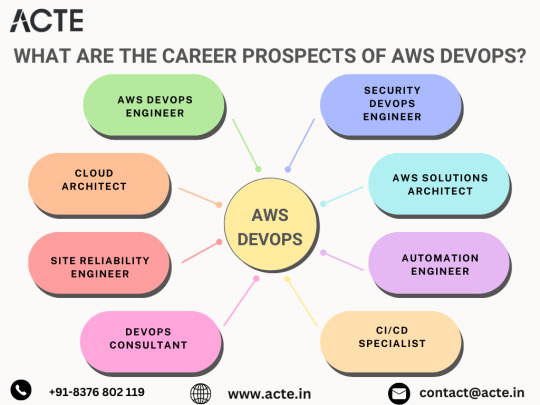
1. Crafting Cloud Solutions: The Role of an AWS DevOps Engineer
Overview: AWS DevOps Engineers serve as architects of automated software development, leveraging AWS cloud services.
Responsibilities: Dive into Infrastructure as Code (IaC), fine-tune AWS tools, and champion the principles of Continuous Integration/Continuous Deployment (CI/CD).
2. Architecting Scalable Cloud Solutions: The Realm of Cloud Architects
Overview: Cloud Architects design scalable and reliable cloud infrastructure on AWS, seamlessly aligning with DevOps principles.
Responsibilities: Collaborate to optimize AWS services, ensuring a resilient and scalable cloud environment.
3. Reliability in the Cloud: The Role of a Site Reliability Engineer (SRE)
Overview: SREs focus on ensuring system reliability, availability, and performance on AWS through vigilant monitoring and automation.
Responsibilities: Implement automation strategies, monitor AWS resources, and respond adeptly to incidents.
4. DevOps Consultancy: Guiding Organizations to DevOps Excellence
Overview: DevOps Consultants provide expertise in implementing DevOps practices, specializing in AWS services.
Responsibilities: Offer guidance on best practices, implement CI/CD pipelines, and optimize workflows using AWS tools.

5. Embedding Security into DevOps: The Role of a Security DevOps Engineer (DevSecOps)
Overview: DevSecOps Engineers integrate security practices into the AWS DevOps pipeline.
Responsibilities: Implement robust security measures, conduct risk assessments, and ensure compliance with security policies.
6. Solutions Architecture on AWS: Crafting Business-Aligned Solutions
Overview: AWS Solutions Architects design and implement solutions aligned with business requirements, utilizing AWS services.
Responsibilities: Collaborate across teams, grasp project intricacies, and architect solutions that optimize AWS resources.
7. Scripting the Future: The Role of an Automation Engineer in AWS
Overview: Automation Engineers script and automate processes within AWS DevOps.
Responsibilities: Script infrastructure deployment, automate testing processes, and lead AWS automation initiatives.
8. Streamlining Software Delivery: The Role of a CI/CD Specialist on AWS
Overview: CI/CD Specialists optimize and streamline the software delivery pipeline within the AWS environment.
Responsibilities: Configure and manage CI/CD tools, ensuring the efficient and reliable delivery of software.
Embarking on an AWS DevOps career journey presents professionals with a landscape rich in challenges and opportunities. Each role within AWS DevOps contributes to a fulfilling and dynamic career trajectory, promising innovation and significant contributions to the ever-evolving technological realm. Best of luck as you navigate the transformative path of AWS DevOps careers!
2 notes
·
View notes
Text
Can Outsourcing Software Development Save You Money?
When building software, businesses face a common dilemma: Hire in-house or outsource development?
While in-house teams offer full control, outsourcing software development can significantly reduce costs — without compromising quality.
But is it the right move for your business? Let’s break it down.
✅ What Is Software Outsourcing?
Outsourcing software development means partnering with an external agency or team to design, develop, test, and maintain your software solution.
This could be:
A full-service software agency
Freelancers or contract developers
Offshore or nearshore development companies
💸 7 Ways Outsourcing Can Save You Money
1. Lower Labor Costs
Hiring in-house developers (especially in the US, UK, or Europe) comes with high salaries, benefits, insurance, etc.
Outsourcing to countries like India, the Philippines, or Eastern Europe can reduce development costs by up to 60%, without sacrificing expertise.
2. No Recruitment or Training Expenses
Hiring the right tech talent is expensive and time-consuming. Outsourcing gives you immediate access to skilled professionals — no need for onboarding or lengthy hiring cycles.
3. Scalable Teams = Cost Flexibility
Need more developers for a tight deadline? Or fewer during a quiet phase? Outsourcing lets you scale your team up or down based on your project stage and budget.
🧠 You only pay for what you use.
4. No Infrastructure Overheads
In-house teams require:
Office space
Laptops, servers
Software licenses
IT support
Outsourcing removes these fixed costs — the agency manages everything on their end.
5. Faster Time to Market
A skilled outsourcing partner brings experience and proven processes, helping you launch your product faster. Less time = lower costs + earlier revenue.
6. Access to a Broader Skillset
Hiring full-time specialists (e.g., UI/UX, DevOps, QA testers) is expensive. Outsourcing gives you on-demand access to a complete team — often for the price of a single hire.
7. Avoid Costly Mistakes
Experienced software agencies have already made (and solved) mistakes on dozens of projects. Their best practices save you from expensive errors, rewrites, or delays.
🔍 But Wait — Isn’t Outsourcing Risky?
It can be if you choose the wrong partner. Here’s how to outsource safely and smartly:
Choose a reliable development agency with verified experience
Look for transparent communication and agile workflows
Sign NDAs and contracts that protect your IP
Start with a small milestone before scaling up
Use project management tools like Trello, Asana, or Jira
🌍 When Does Outsourcing Make the Most Sense?
You're a startup with a limited budget
You want to scale quickly without long-term commitments
You lack in-house technical expertise
You have a tight launch deadline
You want to focus on core business, not tech hiring
🏁 Final Thoughts
Yes, outsourcing software development can save you a lot of money — and just as importantly, time, stress, and missed opportunities.
But savings only come when you:
Choose the right development partner
Communicate clearly
Set realistic goals and timelines
🌕 Why Lunar Enterprises Is the Smart Outsourcing Choice
At Lunar Enterprises, we help startups and businesses build high-quality web and mobile apps at cost-effective rates — with:
Transparent pricing
Agile project delivery
Dedicated project managers
Full-stack development support
Let us be your trusted development team — without the overhead.
#mobile app development#iOS and Android app development#custom app development#cross-platform mobile apps#native app development#app development company in [Location]#flutter app development#technology
0 notes
Text
Skyrocket Your IT Career with DevOps Practitioner Certification
In today’s fast-paced digital landscape, IT professionals are under constant pressure to adapt, evolve, and deliver at scale. If you're looking to supercharge your career with cutting-edge skills, becoming a Certified DevOps Practitioner is the game-changer you need. Explore how the CDP DevOps certification can take your IT career to the next level:
🔧 Master Real-World DevOps Tools and Techniques The DevOps Practitioner Certification is not just about theory it's a hands-on journey into the tools and practices that top organizations use daily. From continuous integration to automated testing and delivery, you'll master what modern IT teams are built on.
🧠 Deepen Your Agile and DevOps Knowledge With a CDP Certification, you’ll gain an in-depth understanding of Agile, Lean, and DevOps principles. This blend empowers you to break down silos, foster collaboration, and drive faster delivery cycles exactly what employers are hunting for.
📈 Increase Your Earning Potential A certified DevOps practitioner stands out in the crowd, especially when applying for leadership or advanced technical roles. Organizations value certified professionals who can demonstrate structured learning and up-to-date DevOps expertise.
🌍 Become Globally Recognized The Certified DevOps Practitioner (CDP) certification from GSDC is globally respected. It validates your credibility and ensures you meet international standards, making your profile highly appealing for global job opportunities.
🛠 Boost Your Hands-On Practical Skillset Unlike basic courses, the CDP certified track immerses you in real-world scenarios that sharpen your problem-solving skills. You'll be ready to take on complex DevOps challenges with confidence and clarity.
📚 Stay Relevant in a Rapidly Evolving Field With DevOps continuously evolving, staying certified ensures you're always aligned with the latest practices. The DevOps certification keeps you on top of trends, making you a strategic asset to any IT organization.
💼 Land High-Impact Job Roles Whether you're eyeing roles like DevOps Engineer, Release Manager, or Automation Specialist, the CDP DevOps certification opens doors to high-demand job profiles in top IT firms worldwide.
📌 Ready to become a Certified DevOps Practitioner? 👉 Enroll today at: https://www.gsdcouncil.org/certified-devops-practitioner 📞 For more details, call us at +41444851189
DevOpsPractitioner #CDPCertified #CertifiedDevOpsPractitioner #DevOpsCertification #CDPDevOps #ITCareerGrowth #TechSkills #AgileTransformation #GSFCCertified #DevOpsEngineer
Let your IT career thrive with speed and precision get CDP certified and lead the future of tech innovation!
#CDP#certified devops practitioner#CDP certification#devops practitioner best practices#devops practitioner certification#devops practitioner#cdp certification#devops certification#devops certifications#devops certification cost
0 notes
Text
How Do the Top Tech Companies Use Software Development Services Differently?
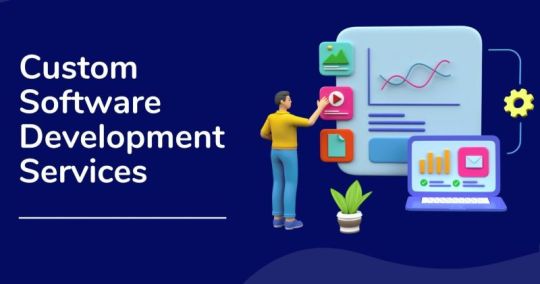
In today’s highly competitive tech-driven world, innovation is non-negotiable. Whether it’s a startup trying to build its MVP or an enterprise optimizing legacy systems, Top Software Development Services play a vital role in enabling long-term growth, digital transformation, and business agility.
But what sets apart industry leaders from the rest?
The answer lies in how top tech companies use software development services differently—with strategy, structure, and scale. This blog will unpack the unique approaches tech giants adopt, and how you can replicate their success by choosing the Top Software Development Services tailored to your goals.
1. They Prioritize Business Goals, Not Just Code
Top tech companies don’t just outsource tasks—they align software development with larger business objectives. Whether building for users, partners, or internal tools, they demand strategic thinking from their software teams. The goal isn’t just to “develop faster” but to solve real business problems efficiently, with the help of Top Software Development Services.
2. They Choose Scalable and Flexible Partners
Rather than sticking with one-size-fits-all solutions, tech leaders opt for Top Software Development Services that offer flexibility, scalability, and deep domain knowledge. They prefer partners who can grow with them, pivot quickly, and adopt emerging technologies—AI, IoT, blockchain—as needed.
3. They Invest in Custom-Built Solutions Early On
Companies like Amazon, Netflix, and Spotify rely heavily on custom-built software to create experiences that off-the-shelf tools simply can’t provide. This is where choosing the right Top Software Development Services makes all the difference.
If you're exploring tailored solutions for your business, check out this Custom Software Development Business Guide to understand the process, cost, and strategic benefits.
4. They Build Cross-Functional Agile Teams
Agility is at the core of modern product development. Leading companies form cross-functional teams that include designers, developers, QA specialists, and DevOps professionals. The Top Software Development Services they engage with often come with built-in agile expertise—ready to integrate into sprints, scrums, and product roadmaps.
5. They Adopt Emerging Tech Early—But Thoughtfully
Being first isn’t everything, but being right is. Top tech brands choose Top Software Development Services that can advise on when and how to integrate cutting-edge tech. Whether it’s AI-powered chatbots, real-time analytics, or microservices architecture, innovation is deployed with purpose.
Book an appointment to find a solution that aligns with your business model and strategic goals.
6. They Localize for Global Impact
Companies going global don’t just translate content—they localize user experience. This involves adapting everything from UI/UX to payment integrations and compliance. By leveraging Top Software Development Services with global delivery capabilities, they ensure fast, efficient, and secure expansion.
Looking to work with reputed service providers? Explore this list of the Top 5 Software Companies in Pune for trustworthy partnerships that deliver at scale.
7. They Value Data-Driven Decision Making
Development decisions are no longer based on gut instinct. Tech giants rely on analytics, A/B testing, and customer feedback loops to continuously improve their digital products. The Top Software Development Services they choose are data-centric, capable of building tools that measure and adapt to real-world usage.
8. They Demand Full-Cycle Software Application Support
From ideation and design to testing, deployment, and maintenance—end-to-end service matters. That’s why leading tech firms partner with Top Software Development Services offering comprehensive support across the entire software lifecycle.
9. They Embrace Application-First Architecture
Modern tech companies focus on modular, API-first, and cloud-native architectures that allow for better scaling and integration. The right development service helps build this solid foundation from Day 1.
Want to dive deeper into this concept? Learn more in this guide on Software Application Development Services—an essential read for businesses looking to evolve their application game.
10. They Treat Software as a Strategic Asset
Rather than viewing software development as a cost center, top tech firms treat it as a revenue driver. Their investment in Top Software Development Services reflects this mindset—with clear KPIs, ROI tracking, and future-focused planning.
11. They Benchmark Against the Best
Top players in the tech space consistently benchmark their development practices against competitors and global leaders. They partner with the Top Software Development Services that deliver proven results, industry recognition, and trusted references.
Want to know who’s leading the charge in custom development? Here’s a list of the Top 10 Custom Software Companies setting global standards.
Final Thoughts
Top tech companies use Top Software Development Services with intention, foresight, and a relentless drive for innovation. They don’t just look for vendors—they seek strategic partners who understand business outcomes just as much as they understand code.
If you want to scale, compete, and lead, it’s time to think like the top players. Choose services that elevate your software into a business weapon.
Let your journey toward digital excellence begin—with the Top Software Development Services guiding your way.
0 notes
Text
Metabolomics Bioinformatician
Job title: Metabolomics Bioinformatician Company: Syngenta Job description: Syngenta scientists. Supporting data generation when required. Networking within Syngenta and the external bioinformatics… chemistry on data processing requirements. processing of metabolomics data using specialist software (vendor or open source… Expected salary: Location: Bracknell, Berkshire Job date: Tue, 01 Jul 2025…
#Automotive#Bioinformatics Specialist#cloud-native#CRM#Crypto#CTO#deep-learning#DevOps#Ecommerce#edtech#erp#ethical AI#game-dev#HPC#Java#mlops#mobile-development#Networking#NFT#project-management#Python#qa-testing#quantum computing#remote-jobs#Salesforce#solutions-architecture#technical-writing#telecoms#ux-design
1 note
·
View note
Text
The ROI of Investing in a Professional Testing Partner
In today's fast-paced digital landscape, software quality can make or break business success. Whether you're a startup launching your first app or a multinational expanding your digital ecosystem, ensuring your software works flawlessly is essential. But how do you achieve that level of excellence without exhausting internal resources?
Enter the professional testing partner — a strategic move that delivers exponential returns. Let’s explore how businesses in the UAE and beyond are unlocking value by collaborating with software testing consultancies like Agile Advisors.
Why Software Quality is a Strategic Asset
Defects, performance lags, or security vulnerabilities can cost companies millions — not only in revenue but in reputation. In a region like the UAE, where digital transformation is booming and user expectations are high, robust software testing isn’t optional; it’s imperative.
A software testing consultancy provides the skills, tools, and methodologies needed to ensure product quality, scalability, and security — all without burdening your internal team.
Key ROI Drivers of Professional Testing Partnerships
1. Accelerated Time-to-Market
Professional testing teams leverage agile methodologies, automation, and domain expertise to shorten testing cycles without compromising quality. This means faster launches, quicker updates, and a significant competitive edge.
2. Reduced Costs and Rework
Bugs caught early are exponentially cheaper to fix. A professional Quality Acceptance Testing (QAT) framework ensures that every release meets performance and usability benchmarks, reducing rework and post-release firefighting.
3. Scalable Expertise
You get access to a pool of experienced testers, automation engineers, and domain specialists — without the overhead of hiring and training an in-house team. This is especially vital for growing tech teams in the UAE and the broader Middle East.
4. Enhanced User Satisfaction and Brand Trust
Clean, functional, and secure software builds user trust and loyalty. In regulated sectors like finance, logistics, and healthcare, passing rigorous QAT checks can also ensure regulatory compliance and avoid penalties.
Why Agile Advisors Stands Out in the UAE
As a leading software testing consultancy, Agile Advisors specializes in transforming testing into a growth enabler. With a strong presence in the software testing - UAE market, the firm offers:
End-to-end manual and automated testing services
Customized Quality Acceptance Testing (QAT) frameworks
Deep integration with DevOps and Agile pipelines
Sector-specific testing expertise (e.g., logistics, fintech, government)
Their consultancy approach means they don't just "test" — they embed quality engineering into your digital DNA.
A Real-World Example: Transforming Logistics Through QAT
A major logistics provider in the UAE partnered with Agile Advisors to roll out a new digital tracking platform. Through comprehensive QAT and performance testing, Agile Advisors:
Detected over 120 critical bugs pre-launch
Reduced user complaints by 85% within 30 days
Helped the client achieve a 98.9% SLA compliance in Q2
This not only improved operational efficiency but elevated the company’s reputation in a competitive market.
Final Thoughts: Quality Is the New Speed
Investing in a professional testing partner like Agile Advisors isn’t just about "checking for bugs." It’s a long-term strategy that boosts product confidence, speeds up innovation, and enhances user satisfaction — all while controlling costs.
As digital disruption intensifies across industries in the UAE, the smartest organizations are those that prioritize software testing as a core pillar of their digital strategy.
Ready to unlock the ROI of professional testing? Partner with a trusted software testing consultancy and lead with confidence.
0 notes
Text
Full Stack Development: The Ultimate Guide for Aspiring Developers
In today’s fast-paced digital world, companies need professionals who can handle both front-end and back-end development. That’s where Full Stack Development comes into play. A Full Stack Developer is the Swiss Army knife of web development — someone who can build both the client-side and server-side of a web application.
In this microblog, we’ll dive deep into what full stack development is, what skills you need, tools you must learn, and how to get started in this high-demand career.
🌐 What is Full Stack Development?
Full stack development refers to the end-to-end development of a web application. It includes both:
Front-End Development – What users interact with (user interface)
Back-End Development – The behind-the-scenes logic and database management
A Full Stack Developer understands how these two layers communicate and can work on both ends, bridging the gap between visual design and functionality.
🎯 Why is Full Stack Development Important?
Full stack developers are highly valued because they bring versatility and efficiency to a project. Here’s why companies love full stack devs:
✅ Can work on both client and server side
✅ Reduced dependency on multiple specialists
✅ Better coordination and faster deployment
✅ Cost-effective for startups and small teams
In simple terms, full stack developers are problem solvers who can build complete web applications on their own.
🧩 Core Components of Full Stack Development
Let’s break down the two main parts:
1. Front-End (Client-Side)
This is everything users see and interact with on a website. Technologies include:
HTML – For structuring web pages
CSS – For styling and layout
JavaScript – For interactivity
Front-end frameworks: React.js, Angular, Vue.js
2. Back-End (Server-Side)
This handles the logic, database operations, and user authentication. Technologies include:
Programming languages: Node.js (JavaScript), Python, PHP, Ruby, Java
Frameworks: Express.js, Django, Laravel, Spring
Databases: MySQL, MongoDB, PostgreSQL
APIs: RESTful services and GraphQL
🔧 Essential Tools for Full Stack Developers
Mastering full stack development means becoming familiar with a wide set of tools:
Version Control:
Git & GitHub – For code collaboration and version tracking
Code Editors:
Visual Studio Code – Popular among developers for its versatility
Development Tools:
Chrome DevTools – For debugging front-end code
Postman – For testing APIs
Docker – For containerization and deployment
Deployment:
Heroku, Netlify, Vercel, AWS, or Firebase
📚 Must-Have Skills for Full Stack Developers
Here are the key skills you should develop:
✅ Technical Skills:
Proficiency in HTML, CSS, and JavaScript
Knowledge of front-end frameworks like React or Angular
Understanding of server-side programming (Node.js, Python, etc.)
Working with databases (SQL and NoSQL)
Understanding of APIs (REST & GraphQL)
Familiarity with DevOps and deployment practices
✅ Soft Skills:
Problem-solving mindset
Good communication
Time management
Team collaboration
Adaptability to new tech
🌍 Popular Tech Stacks
A tech stack is a combination of tools used to build an application. Some popular full stack stacks are:
1. MERN Stack:
MongoDB (Database)
Express.js (Back-End)
React.js (Front-End)
Node.js (Server)
2. MEAN Stack:
MongoDB
Express.js
Angular
Node.js
3. LAMP Stack:
Linux
Apache
MySQL
PHP
4. Django Stack:
Python
Django
PostgreSQL or SQLite
React or plain HTML/CSS/JS for front-end
👨💻 A Day in the Life of a Full Stack Developer
A full stack developer’s workday might include:
Designing user interfaces
Writing server-side business logic
Integrating with databases
Debugging and testing
Deploying apps on the cloud
Participating in team meetings and code reviews
They usually work closely with UI/UX designers, other developers, and project managers.
📈 Career Scope and Opportunities
Full stack development is one of the most in-demand career paths in tech. Companies ranging from startups to big tech giants are hiring full stack developers for roles such as:
Full Stack Web Developer
Software Engineer
Back-End/Front-End Developer (with full stack knowledge)
DevOps Engineer
Tech Lead
💸 Salary Expectations
Salaries vary based on experience and location. On average:
Entry-level (0–2 years): ₹4–8 LPA in India / $60,000–$80,000 in the US
Mid-level (3–5 years): ₹9–15 LPA / $90,000–$110,000
0 notes
Text
Embarking on a Digital Journey: Your Guide to Learning Coding
In today's fast-paced and ever-evolving technology landscape, DevOps has emerged as a crucial and transformative field that bridges the gap between software development and IT operations. The term "DevOps" is a portmanteau of "Development" and "Operations," emphasizing the importance of collaboration, automation, and efficiency in the software delivery process. DevOps practices have gained widespread adoption across industries, revolutionizing the way organizations develop, deploy, and maintain software. This paradigm shift has led to a surging demand for skilled DevOps professionals who can navigate the complex and multifaceted DevOps landscape.

Exploring DevOps Job Opportunities
DevOps has given rise to a spectrum of job opportunities, each with its unique focus and responsibilities. Let's delve into some of the key DevOps roles that are in high demand:
1. DevOps Engineer
At the heart of DevOps lies the DevOps engineer, responsible for automating and streamlining IT operations and processes. DevOps engineers are the architects of efficient software delivery pipelines, collaborating closely with development and IT teams. Their mission is to accelerate the software delivery process while ensuring the reliability and stability of systems.
2. Site Reliability Engineer (SRE)
Site Reliability Engineers, or SREs, are a subset of DevOps engineers who specialize in maintaining large-scale, highly reliable software systems. They focus on critical aspects such as availability, latency, performance, efficiency, change management, monitoring, emergency response, and capacity planning. SREs play a pivotal role in ensuring that applications and services remain dependable and performant.
3. Automation Architect
Automation is a cornerstone of DevOps, and automation architects are experts in this domain. These professionals design and implement automation solutions that optimize software development and delivery processes. By automating repetitive and manual tasks, they enhance efficiency and reduce the risk of human error.
4. Continuous Integration/Continuous Deployment (CI/CD) Engineer
CI/CD engineers specialize in creating, maintaining, and optimizing CI/CD pipelines. The CI/CD pipeline is the backbone of DevOps, enabling the automated building, testing, and deployment of code. CI/CD engineers ensure that the pipeline operates seamlessly, enabling rapid and reliable software delivery.
5. Containerization Specialist
The rise of containerization technologies like Docker and orchestration tools such as Kubernetes has revolutionized software deployment. Containerization specialists focus on managing and scaling containerized applications, making them an integral part of DevOps teams.
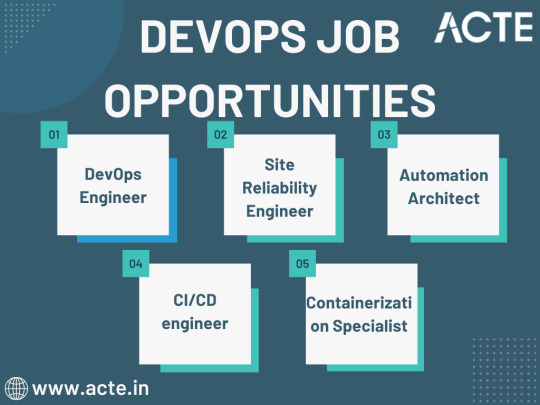
Navigating the DevOps Learning Journey
To embark on a successful DevOps career, individuals often turn to comprehensive training programs and courses that equip them with the necessary skills and knowledge. The DevOps learning journey typically involves the following courses:
1. DevOps Foundation
A foundational DevOps course covers the basics of DevOps practices, principles, and tools. It serves as an excellent starting point for beginners, providing a solid understanding of the DevOps mindset and practices.
2. DevOps Certification
Advanced certification courses are designed for those who wish to delve deeper into DevOps methodologies, CI/CD pipelines, and various tools like Jenkins, Ansible, and Terraform. These certifications validate your expertise and enhance your job prospects.
3. Docker and Kubernetes Training
Containerization and container orchestration are two essential skills in the DevOps toolkit. Courses focused on Docker and Kubernetes provide in-depth knowledge of these technologies, enabling professionals to effectively manage containerized applications.
4. AWS or Azure DevOps Training
Specialized DevOps courses tailored to cloud platforms like AWS or Azure are essential for those working in a cloud-centric environment. These courses teach how to leverage cloud services in a DevOps context, further streamlining software development and deployment.
5. Advanced DevOps Courses
For those looking to specialize in specific areas, advanced DevOps courses cover topics like DevOps security, DevOps practices for mobile app development, and more. These courses cater to professionals who seek to expand their expertise in specific domains.
As the DevOps landscape continues to evolve, the need for high-quality training and education becomes increasingly critical. This is where ACTE Technologies steps into the spotlight as a reputable choice for comprehensive DevOps training.
They offer carefully thought-out courses that are intended to impart both foundational information and real-world, practical experience. Under the direction of knowledgeable educators, students can quickly advance on their path to become skilled DevOps engineers. They provide practical insights into industrial practises and issues, going beyond theory.
Your journey toward mastering DevOps practices and pursuing a successful career begins here. In the digital realm, where possibilities are limitless and innovation knows no bounds, ACTE Technologies serves as a gateway to a thriving DevOps career. With a diverse array of courses and expert instruction, you'll find the resources you need to thrive in this ever-evolving domain.
3 notes
·
View notes
Text
Step Into 2025 with GSDC’s Cloud Asset Management Certification

Introduction
The tech world moves fast, but there’s one trend that’s not slowing down anytime soon—cloud management. While everyone’s talking about cloud development, the real demand is shifting toward smart cloud asset management. And guess what? GSDC’s cloud asset management certification is quickly becoming the go-to credential for career growth in 2025.
☁️ Why Cloud Asset Management Is Hot Right Now
Think of cloud asset management like the backbone of modern IT operations. As businesses move workloads to the cloud, they’re realizing they need experts who can track costs, prevent sprawl, and ensure compliance. That’s where you come in—with the right certification.
The cloud asset management certification isn’t just another paper to add to your wall. It’s proof that you can take a company’s cloud ecosystem and make it lean, efficient, and secure. Pair it with a cloud testing certification or a cloud management certification, and you’ll have a skill set employers are actively seeking.
🎯 How It Powers Your Career
A cloud asset management certification doesn’t just teach you technical know-how—it opens doors. Here’s what it can do for you:
Make your resume stand out in a competitive IT job market
Equip you with expertise in asset management in cloud computing
Give you a career boost into roles like Cloud Governance Lead, IT Asset Manager, or FinOps Specialist
Show you’re ready for the strategic side of cloud, not just the operational grind
And if you’ve already got a cloud management certification, this credential makes you even more versatile.
📚 What You’ll Learn at GSDC
With GSDC’s cloud asset management certification, you’ll gain practical skills like:
Auditing and tagging cloud resources
Controlling costs and improving ROI
Implementing compliance and governance standards
Integrating asset management with DevOps
Automation techniques for smarter resource handling
Want to take it further? Adding a cloud testing certification ensures you’re not only managing assets but guaranteeing performance quality.
🛠️ How to Get Certified
The process couldn’t be simpler:
Visit GSDC’s official certification page
Sign up for the cloud asset management certification course
Study online at your own pace
Take the exam (yes, from home!)
Add your new credential to LinkedIn and watch the opportunities roll in
🚀 The 2025 Cloud Career Hack
Here’s the truth: cloud jobs aren’t going anywhere. But the roles that pay more are the ones that bridge technical expertise with cost, strategy, and governance. That’s exactly what the cloud asset management certification offers.
When you stack it with a cloud management certification or a cloud testing certification, you’re not just a cloud professional—you’re a cloud strategist.
So, are you ready to make 2025 your breakout year? 🌐
For More Information: - https://www.gsdcouncil.org/certified-cloud-asset-management
Contact:- +41 41444851189
#CloudAssetManagementCertification #CloudAssetManagement #AssetManagementInCloudComputing #CloudManagementCertification #CloudTestingCertification #GSDCTrending #FutureTechSkills #CloudStrategy #ITCareerBoost #CloudJobs2025
0 notes
Text
How to Find High-Paying Software Engineer Jobs in the UK in 2025
Are you looking to build a rewarding tech career in one of the fastest-growing sectors in the UK? With digitalisation accelerating across all industries, Software Engineer jobs UK are in high demand. From fintech to AI, the need for talented developers is stronger than ever. This guide will help you understand the current job landscape, skill requirements, salaries, and how to find your ideal role in the UK tech market.
The State of Software Engineering Jobs in the UK
The UK is one of Europe’s leading tech hubs, hosting thousands of startups, scaleups, and enterprise-level companies. According to Tech Nation, the tech sector employs over 3 million professionals, and software engineers form the backbone of this growth.
As of 2025, employers are increasingly searching for candidates with full-stack development skills, cloud expertise, and experience with scalable architecture. If you're considering a career move or starting fresh, there are ample Software Engineer jobs UK that match a wide range of interests and specialisations.
Who’s Hiring?
Top employers hiring for Software Engineer jobs UK include:
Amazon, Google, and Microsoft – Tech giants with development centres in London and Cambridge
Revolut, Monzo, and Starling Bank – Fintech leaders hiring for backend and mobile development
BT, Vodafone, and Sky – Looking for engineers in telecom and media software
Government agencies and NHS Digital – For secure and large-scale public sector systems
Startups in AI, healthtech, and green tech – Often offer equity and flexible remote positions
Whether you're targeting enterprise roles or want to work at an agile startup, the UK job market offers options across industries.
Essential Skills for UK Software Engineers
To qualify for top-tier Software Engineer jobs UK, your skillset must align with what employers expect in 2025.
Core Technical Skills:
Languages: Python, JavaScript, Java, Go, TypeScript, C#
Web Development: React, Node.js, Vue.js, Next.js
Cloud Computing: AWS, Azure, GCP, Docker, Kubernetes
CI/CD & DevOps: Jenkins, GitLab CI, GitHub Actions
Database Systems: MySQL, PostgreSQL, MongoDB, Redis
Desirable Extras:
Mobile development (Flutter, React Native, Swift)
AI/ML experience (PyTorch, TensorFlow)
Agile & Scrum knowledge
Test-driven development (TDD)
When applying for Software Engineer jobs UK, always tailor your CV to highlight the technologies and methodologies listed in the job description.
Top Locations for Software Engineering Roles
While London continues to dominate, other UK cities offer fantastic job opportunities with better cost of living and work-life balance.
High-demand regions:
London: Highest salaries, fintech startups, and global HQs
Manchester: Fast-growing tech ecosystem with many remote/hybrid roles
Bristol & Bath: Green tech and aerospace software development
Leeds: Strong demand for engineers in e-commerce and healthcare
Cambridge: AI, data science, and R&D-centric software roles
Many Software Engineer jobs UK are now remote-friendly, allowing you to work from anywhere with occasional office visits.
Salary Expectations in 2025
Here’s what you can expect based on experience and skill level: Role LevelAnnual Salary (GBP)Entry-Level£30,000 – £45,000Mid-Level£45,000 – £70,000Senior Engineer£70,000 – £100,000+Lead/Architect£100,000 – £130,000+
Specialist roles such as cloud engineers or those with AI/ML expertise may command higher compensation. Contract-based Software Engineer jobs UK can also offer daily rates of £400–£800 depending on the project.
How to Stand Out in a Competitive Market
With so many developers vying for top roles, you need to differentiate yourself. Here's how:
Build a Public Portfolio: Contribute to GitHub projects and share your work on personal blogs or LinkedIn.
Earn Certifications: Google Cloud, AWS Developer, or Microsoft Azure certifications improve your profile.
Network with Recruiters: Attend UK tech events, meetups, and online communities like Stack Overflow.
Tailor Every Application: Customise your CV and cover letter for each role. Use specific keywords from job ads to improve ATS visibility.
Prepare for Technical Interviews: Practice coding assessments on HackerRank, LeetCode, or Codility.
With the right preparation, you'll unlock top-tier Software Engineer jobs UK with ease.
Remote and Hybrid Work Trends
Post-pandemic, flexible working is now a standard offering in tech roles. Many companies are offering:
Remote-first contracts with occasional office visits
Four-day work weeks
Flexible hours and asynchronous teams
Distributed teams across UK and EU time zones
If flexibility is important to you, filter Software Engineer jobs UK by remote/hybrid options using platforms like IT Job Board.
Why Use IT Job Board UK?
The IT Job Board UK is a dedicated tech job portal trusted by thousands of recruiters and job seekers. Here's why it's ideal for software engineers:
Curated listings from verified UK tech companies
Ability to filter jobs by location, salary, skills, or company
Apply directly without middlemen
Receive job alerts tailored to your profile
Career advice and resume optimisation tips
Your journey to the best Software Engineer jobs UK starts here.
Conclusion
The software engineering field in the UK is thriving, with more opportunities than ever in 2025. Whether you're just entering the industry or looking to advance your career, there's a role that matches your goals and interests. From remote jobs to leadership roles, Software Engineer jobs UK promise exciting work, high pay, and long-term career growth. Stay updated, keep learning, and apply through trusted platforms like the IT Job Board to land your next big opportunity.
0 notes
Text
DevOps vs. Software Development: The Secret to Faster, Better Software!
Are you leveraging the full potential of your tech teams? DevOps specialists focus on automation, infrastructure management, and process optimization, while Software Developers concentrate on creating and testing features.
When these roles work in harmony, your organization benefits from shorter release cycles, improved reliability, and enhanced scalability. Want to learn how to implement these practices effectively? Let’s chat! Inventcolabs is here to guide you every step of the way.
👉 Check out the slides below for insights.
Contact us today and take your software delivery to the next level!
📞 +1-646-917-8081 🌐
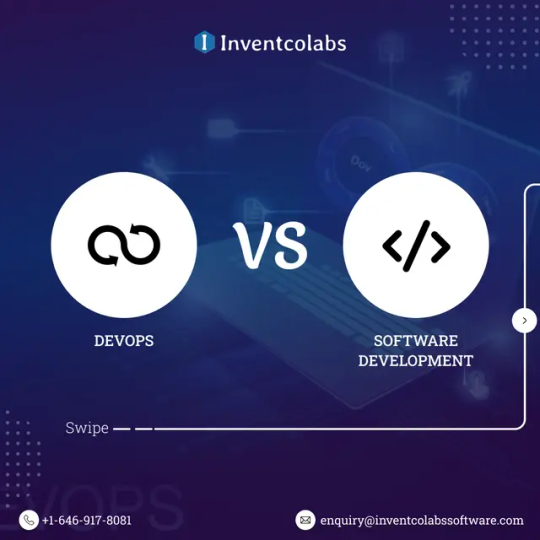
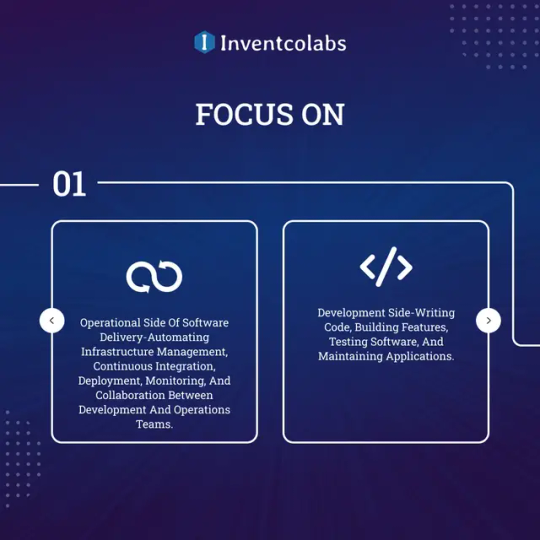
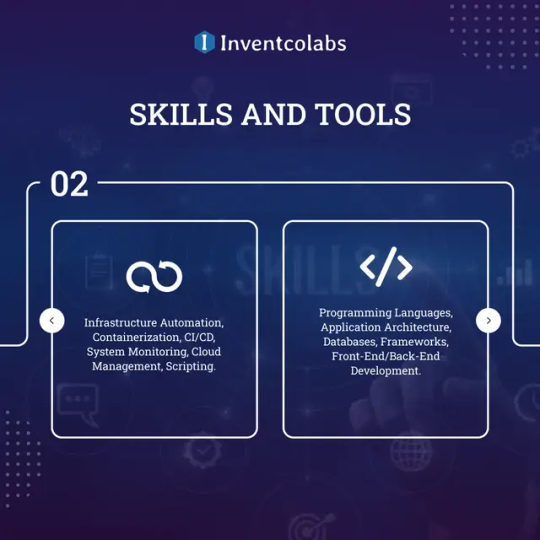

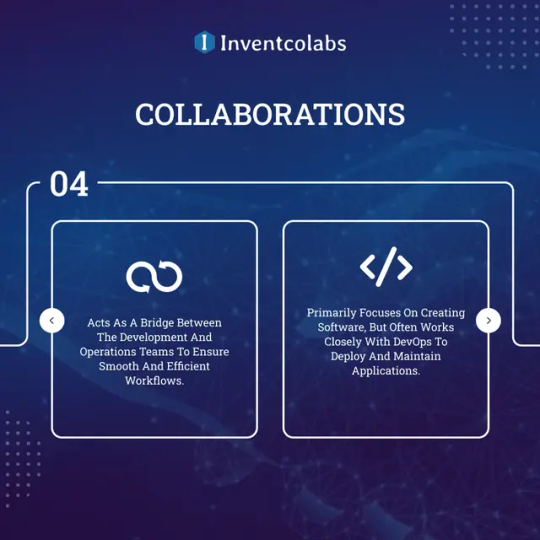
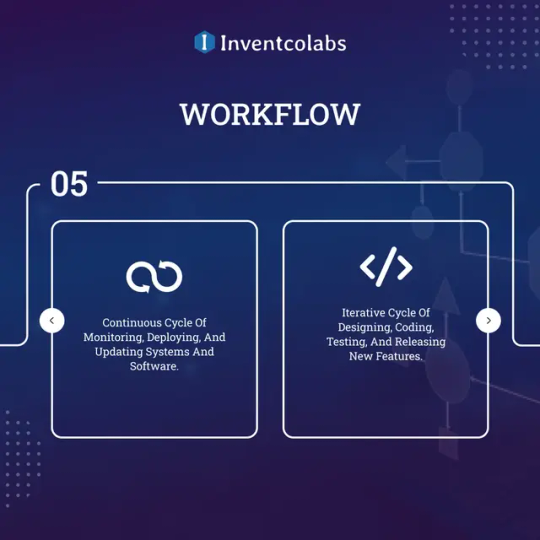
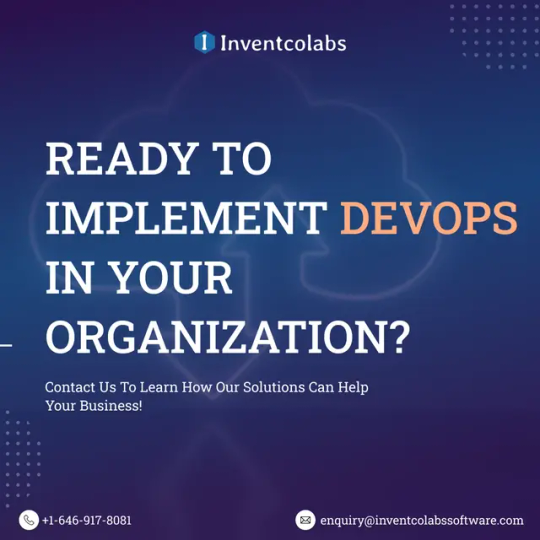
#devops#appdevelopment#techinnovation#techtrends#mobileappdevelopment#digitalinnovation#appdevelopmentcompany#softwaredevelopment#digitaltransformation#mobile app development#technology
0 notes
Text
Hire a Dedicated Laravel Developer
1. Snapshot: Why This Guide Matters
Laravel remains one of the most productive, elegant PHP frameworks for building scalable web apps, SaaS platforms, admin portals, multi-tenant products, and API-driven ecosystems. Whether you’re expanding an MVP, refactoring legacy PHP, or building a high-availability enterprise platform, choosing the right engagement model is critical. Should you hire a Dedicated Laravel Developer? Is it better to hire a Laravel Developer India for cost leverage and round-the-clock velocity? Or do you need the broader delivery governance of a Custom Software Development Company USA partner for compliance and enterprise onboarding? This guide breaks it down into actionable points.

2. When Hiring a Dedicated Laravel Developer Makes Sense
Engage a focused Laravel specialist (or pod) when:
You’re scaling fast and need feature velocity on an existing Laravel codebase.
API-first product demands well-structured REST or GraphQL endpoints.
Complex business logic (billing, roles/permissions, subscription tiers) lives in the backend.
Tech debt dragging delivery—migrations, outdated packages, unversioned env configs.
Need rapid prototypes that can graduate to production.
Rule of Thumb: If 60%+ of current sprint stories are backend/Laravel-focused, a dedicated hire is usually ROI-positive within two sprints.
3. Benefits of Hiring a Laravel Developer in India
If you plan to Hire Laravel Developer India, consider the strategic upside:
Cost Efficiency – Competitive hourly and monthly rates vs. US/EU.
Large Talent Pool – Deep PHP + Laravel community; experience across eCommerce, SaaS, fintech, and custom ERP builds.
Time-Zone Coverage – India + US overlap windows enable near 24‑hour development cycles with staggered teams.
English Communication & Global Delivery Maturity – Many Indian engineers work with US, UK, and AU clients regularly.
Flexible Engagement Models – Part-time, full-time, or squad-based.
Tip: Request code samples, Git repos, or technical assignments to evaluate real Laravel craftsmanship—service container use, queueing, events, jobs, policies.
4. When You Need a Custom Software Development Company USA Involved
Individual developers are great for feature throughput, but product growth often requires structure. A Custom Software Development Company USA can bring:
Compliance Alignment – SOC 2, HIPAA, PCI, GDPR-driven process maturity.
Contracting & Procurement Fit – Easier onboarding for US enterprises and funded startups.
Cross‑Disciplinary Teams – DevOps, QA automation, product design, data engineering.
Onshore Project Management – Stakeholder workshops during US business hours.
IP & Legal Clarity – US law jurisdiction, NDAs, work-for-hire agreements.
Hybrid Model: Combine an Indian delivery engine (cost + scale) with a US lead vendor for governance, account management, and client-facing reporting. Many companies quietly operate this way to balance budget and trust.
5. Core Laravel Services to Expect
From freelancers, agencies, or full custom shops, insist on:
Greenfield Laravel App Development – Modules, routing, controllers, models, Blade or Inertia/Vue/React frontends.
API & Microservice Buildouts – Token auth, rate limiting, versioning, Swagger/OpenAPI docs.
Database Design & Migrations – Relational integrity, indexing, seeders, factories.
Authentication & Authorization – Laravel Breeze, Jetstream, Passport, Sanctum.
Queues, Jobs & Events – Redis, SQS, RabbitMQ for async workloads.
Testing Strategy – PHPUnit, Pest, feature + integration test pipelines.
Performance Tuning – Caching, Horizon, Octane, database query optimization.
Maintenance & Version Upgrades – From legacy 5.x to current LTS.
6. Vendor Qualification Checklist (Copy/Paste)
Technical Depth
Laravel version experience (LTS? latest?).
Use of service container + SOLID patterns.
API pagination, resources, and transformers.
Queue workers + scheduled jobs management.
Quality & DevOps
CI/CD stack? (GitHub Actions, GitLab CI, Jenkins.)
Automated tests + coverage metrics.
Env management (.env secrets, Vault, parameter store.)
Security
Input validation, mass-assignment protection.
CSRF, XSS,& SQL injection mitigation.
Dependency scanning + patch cadence.
Business Fit
Handles US time overlap? Weekly demo cadence?
Prior experience integrating with US SaaS/payment stacks (Stripe, Auth0, Twilio, HubSpot)?
7. Cost Drivers You Should Model
Team Composition – Senior vs. mid-level mix.
Scope Volatility – Product-led orgs change fast; budget buffers help.
Integrations – Payment gateways, CRM, ERP, marketing automation.
Infrastructure & Hosting – AWS, DigitalOcean, Azure; container vs. shared.
Compliance & Documentation – Adds PM + audit effort.
Refactoring Legacy PHP – Migrating raw PHP, CodeIgniter, or Laravel 5 apps increases cost.
Budget Tip: Ask vendors to split Build / Maintain / Optimize into separate cost tracks so you can phase spend.
8. SEO & Conversion Tips for Your Service Page
To rank without stuffing:
Use Hire a Dedicated Laravel Developer in H1 or intro.
Include Hire Laravel Developer India in a geo-value or pricing comparison section.
Reference Custom Software Development Company USA in a credibility/compliance/enterprise trust block.
Add supporting terms: Laravel consulting, Laravel upgrade services, Laravel API development, and a remote Laravel team.
Publish a case study with load time, feature velocity, or cost savings metrics.
Add strong CTA buttons: "Request Laravel Audit," "Hire Dedicated Team," "Talk to US Delivery Lead."
9. 12-Step Implementation Roadmap
Define business goals + KPIs (feature velocity, uptime, conversion).
Audit the current PHP/Laravel or legacy stack.
Prioritize must-fix security + upgrade tasks.
Choose engagement path (dedicated, India, US partner, hybrid).
Align sprint cadence + tooling (Git, Jira, Slack, CI/CD).
Establish coding standards + branching model.
Set up staging + automated deployments.
Implement core modules / APIs.
Add auth, roles, and billing.
Performance + load testing.
UAT + stakeholder signoff.
Launch + monitored maintenance retainers.
10. Final Takeaway & Call to Action
You don’t have to choose between speed and structure. Start lean: Hire Dedicated Laravel Developer to accelerate delivery. Expand smart: Hire Laravel Developer India teams for scale and cost efficiency. And when governance, compliance, or enterprise growth becomes a priority, partner with a Custom Software Development Company USA that can integrate everything under one delivery model.
Ready to move? Share your project stage, tech stack, budget range, and launch timeline—I’ll help you shape a shortlist and next steps.
0 notes